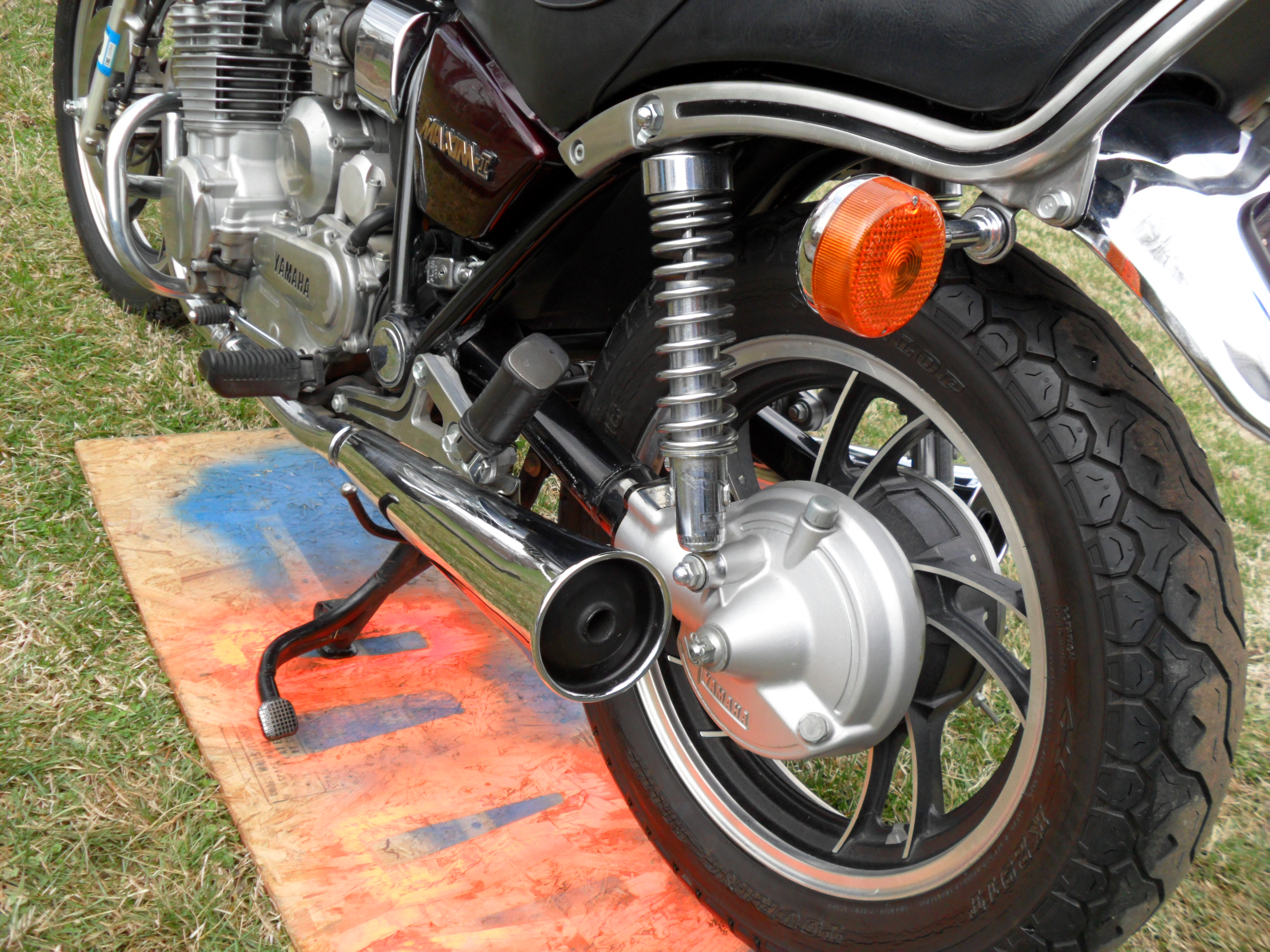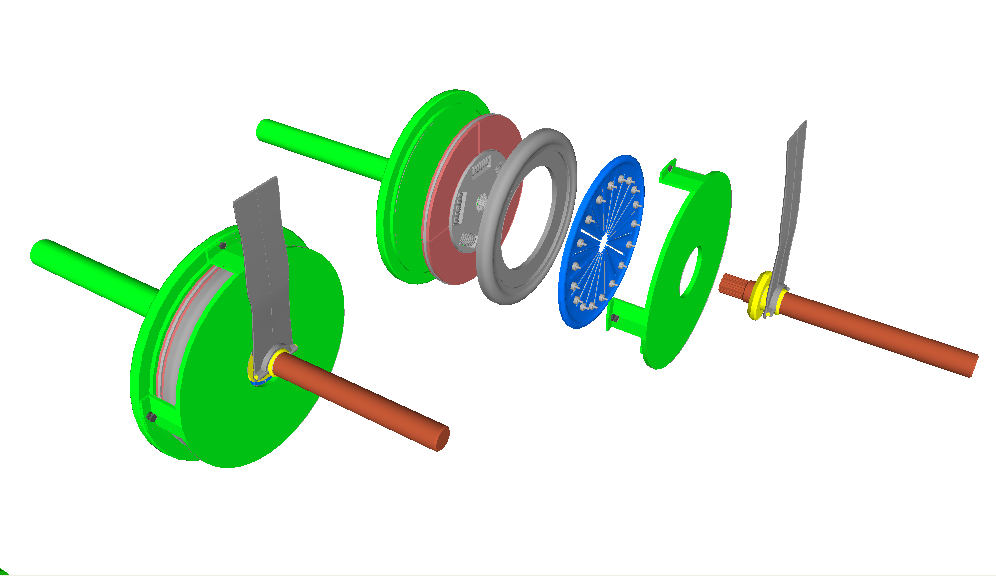|
Honda VFR750R
The Honda VFR750R, model code 'RC30', is a fully faired, solo-seat-only racing motorcycle created for homologation purposes for the World Superbike Championship by Honda Racing Corporation (HRC). It was first released to the Japanese market in 1987, released in Europe in 1988 then the United States in 1990. There were only 3,000 made and they sold for - a very large amount for a production bike at the time. Engine The 748 cc 16-valve gear driven double overhead camshaft liquid-cooled RC24-derived 90° V4 produced at 9,500 rpm for the restricted Japanese model and @ 11,000 rpm elsewhere. It contained race-inspired components. These included such items as titanium connecting rods that reduced reciprocating weight ( lighter and eight times the cost) and gear driven camshafts. The engine firing configuration was very different from the road-going VFR750F from which it was derived with a 360° 'big bang' crank arrangement instead of the smoother 180°. This fea ... [...More Info...] [...Related Items...] OR: [Wikipedia] [Google] [Baidu] |
VFR750F
The Honda VFR750F is a motorcycle manufactured by Japanese automobile manufacturer Honda from 1986 to 1997. The model was initially displayed to the press after the 1985 Bol d'Or before it was officially introduced in 1986. The motorcycle is a variation of sport bike and sport touring. The motorcycle is powered by a V4 engine that was developed from the VF700/750F models. The motorcycle's design is an evolution and complete redesign of the VF700/750F models. This redesign included multiple new features, including greater power output (104 hp up from 83 hp), lighter weight (claimed down 20 kg), a lower centre of gravity, a wider front tire, a slightly shorter wheelbase (15mm), six gear ratios instead of five and gear driven cams. Engine The Honda VFR750F uses a V4 engine that is primarily made of cast aluminium alloy, with the crankcase breather being divided horizontally. The engine is a carburettor-based air/fuel induction, , 16-valve, gear-driven DOHC, ... [...More Info...] [...Related Items...] OR: [Wikipedia] [Google] [Baidu] |
Fred Merkel
Fred Merkel (born September 28, 1962, in Stockton, California) is an American former professional motorcycle road racing, road racer and two-time Superbike World Championship, Superbike World Champion. Motorcycle racing career In 1984 he teamed with Mike Baldwin (motorcyclist), Mike Baldwin to win the Suzuka 8 Hours endurance race. He is a three-time AMA Superbike Champion, winning in 1984/5 on the VF750 and 1986 on the VFR750F. He jointly holds the record for the most wins in a season with Mat Mladin. In the Superbike World Championship began, with Merkel entered on the Honda VFR750R, RC30. He won the championship from Fabrizio Pirovano and Davide Tardozzi with two wins and three other podiums. He successfully defended the crown in , with 3 wins, 7 other podiums, and 4 poles. He took three more wins en route to sixth overall in , but was less competitive after this. Merkel retired from racing at the end of the 1995 season after being injured in an accident at Firebird Internat ... [...More Info...] [...Related Items...] OR: [Wikipedia] [Google] [Baidu] |
Swingarm
A swingarm, or "swinging arm" (UK), originally known as a swing fork or pivoted fork, is a single or double sided mechanical device which attaches the rear wheel of a motorcycle to its body, allowing it to pivot vertically. The main component of the rear suspension of most modern motorbikes and ATVs, it holds the rear axle firmly, while pivoting to absorb bumps and suspension loads induced by the rider, acceleration, and braking. Originally motorcycles had no rear suspension, as their frames were little more than stronger versions of the classic diamond frame of a bicycle. Many types of suspension were tried, including Indian's leaf spring suspended swingarm, and Matchless's cantilevered coiled-spring swingarm. Immediately before and after World War II, the plunger suspension, in which the axle moved up and down two vertical posts, became commonplace. In the latter, the movement in each direction was against coiled springs. Some manufacturers, such as Greeves, used swingarm ... [...More Info...] [...Related Items...] OR: [Wikipedia] [Google] [Baidu] |
Brake Pad
Brake pads are a component of disc brakes used in automotive and other applications. Brake pads are composed of steel backing plates with friction material bound to the surface that faces the disc brake rotors. Function Brake pads convert the kinetic energy of a vehicle to thermal energy through friction. Two brake pads are contained in the brake with their friction surfaces facing the rotor. When the brakes are hydraulically applied, the caliper clamps or squeezes the two pads together onto the spinning rotor to slow and stop the vehicle. When a brake pad heats up due to contact with the rotor, it transfers small amounts of its friction material onto the disc, leaving a dull grey coating on it. The brake pad and disc (now both having the friction material), then "stick" to each other, providing the friction that stops the vehicle. In disc brakes, there are usually two brake pads per disc rotor, they both function together. These are held in place and actuated by a caliper affixe ... [...More Info...] [...Related Items...] OR: [Wikipedia] [Google] [Baidu] |
Redline
Redline refers to the maximum engine speed at which an internal combustion engine or traction motor and its components are designed to operate without causing damage to the components themselves or other parts of the engine. The redline of an engine depends on various factors such as stroke, mass of the components, displacement, composition of components, and balance of components. The word is also used as a verb, meaning to ride or drive an automotive vehicle above the redline. The actual term ''redline'' comes from the red bars that are displayed on tachometers in cars starting at the rpm that denotes the redline for the specific engine. Operating an engine in this area is known as ''redlining''. Straying into this area usually does not mean instant engine failure, but may increase the chances of damaging the engine. Variation of redline The acceleration, or rate of change in piston velocity, is the limiting factor. The piston acceleration is directly proportional to the mag ... [...More Info...] [...Related Items...] OR: [Wikipedia] [Google] [Baidu] |
Crankshaft
A crankshaft is a mechanical component used in a piston engine to convert the reciprocating motion into rotational motion. The crankshaft is a rotating shaft containing one or more crankpins, that are driven by the pistons via the connecting rods. The crankpins are also called ''rod bearing journals'', and they rotate within the "big end" of the connecting rods. Most modern crankshafts are located in the engine block. They are made from steel or cast iron, using either a forging, casting or machining process. Design The crankshaft located within the engine block, held in place via main bearings which allow the crankshaft to rotate within the block. The up-down motion of each piston is transferred to the crankshaft via connecting rods. A flywheel is often attached to one end of the crankshaft, in order to smoothen the power delivery and reduce vibration. A crankshaft is subjected to enormous stresses, in some cases more than per cylinder. Crankshafts for sing ... [...More Info...] [...Related Items...] OR: [Wikipedia] [Google] [Baidu] |
Clutch
A clutch is a mechanical device that engages and disengages power transmission, especially from a drive shaft to a driven shaft. In the simplest application, clutches connect and disconnect two rotating shafts (drive shafts or line shafts). In these devices, one shaft is typically attached to an engine or other power unit (the driving member), while the other shaft (the driven member) provides output power for work. Typically the motions involved are rotary, but linear clutches also exist. In a motor vehicle, the clutch acts as a mechanical linkage between the engine and transmission, and briefly disconnects, or separates the engine from the transmission system. This disconnects the drive wheels whenever the clutch pedal is depressed, allowing the driver to smoothly change gears. In a torque-controlled drill, for instance, one shaft is driven by a motor, and the other drives a drill chuck. The clutch connects the two shafts so they may be locked together and spin at the ... [...More Info...] [...Related Items...] OR: [Wikipedia] [Google] [Baidu] |
Honda RVF750 RC45
The Honda RVF750R RC45 was a fully faired racing motorcycle created for homologation purposes for the Superbike World Championship by Honda Racing Corporation. The RVF750R was the successor to the VFR750R RC30 (not to be confused with the sport touring VFR750F). Like its predecessor, the RVF750R featured a DOHC liquid-cooled V4 4-stroke engine with gear driven cams and a single-sided swingarm, but unlike the RC30 it utilized electronic fuel injection, in a setup very similar to the production 1992 NR750. The US spec engine had a 749.2cc capacity and was rated at 101 horsepower; the European version was rated at 118 horsepower. A simple rewire modification to the PGM-FI box increased power in the US engine up to the 118 hp. It was manufactured from 1994 until 1995 and sold in limited numbers (the United States receiving the model for its first year only), followed by the VTR1000R SP-1 RC51 in 2000. Unlike the VFR750R RC30 and VFR750F from which the engine was originall ... [...More Info...] [...Related Items...] OR: [Wikipedia] [Google] [Baidu] |
Slipper Clutch
A slipper clutch ''(also known as a back-torque limiter)'' is a specialized clutch with an integrated freewheel mechanism, developed for performance-oriented motorcycles to mitigate the effects of engine braking when riders decelerate. The main purpose of a slipper clutch is to prevent over engine rev and rear wheel hop (or clatter) especially under hard braking in a vehicle (usually performance motorcycles). It does so by partially slipping until engine's speed matches with the vehicle's speed upon sudden braking. Design The slipper clutch consists of two bases, one with dog clutches and ramps with ball bearings, a splined hub, and clutch plates. In normal operation, the dog clutches mate, driving the transmission. When a back torque comes from the transmission, the splined hub slides up the bearing ramps, disconnecting from the clutch plates and allowing a limited slip between input and output. This type of clutch is designed to partially disengage or "slip" when the rear ... [...More Info...] [...Related Items...] OR: [Wikipedia] [Google] [Baidu] |





